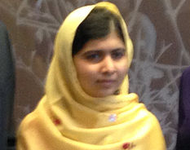The Story of Malala, and its Misuse for the Western Culture War

by Peter Baofu, Ph.D.
The story of Malala Yousafzai, the 16 years old Pakistani activist for girls' education, is tragic, not because she endured the assassination attempt by the Taliban in 2012, but because her historical narrative has been "misused" for the Western culture war around the world, especially (though not exclusively) as a propaganda tool of the West for the "war on terror" in the Muslim World (and beyond).
Right from its early beginning, the story of Malala was "framed" to promote Western soft power, especially in the Islamic world where innocent civilians die daily or weekly over the years (due to chronic Western military strikes) and authoritarian regimes remain in place (often with the ruthless support of Western powers).
For example, back in 2009, when Malala was only 12 years old, the BBC in the U.K. used the story of her life in the Swat Valley in Pakistan to depict the "oppressive" Taliban rule (in a blog under a pseudonym), at a time when the Western "war on terror" in the region killed a lot of people, often at a ratio of so many more innocent civilians for a few radical militants. Then, in 2010, the New York Times in the U.S. made a documentary about her life to further spread her story.
But this spread of her story against the Taliban led to the assassination attempt on her life by some Taliban gunmen on October 09, 2012, which encouraged the German international broadcaster Deutsche Welle to call her "the most famous teenager in the world" (in January of 2013). Shortly after, the former British Prime Minister Gordon Brown used his position as the United Nations Special Envoy for Global Education to launch a UN petition, using the slogan "I am Malala." On April 29 of 2013, Time magazine in the U.S. featured her on the magazine's front cover as one of "The 100 Most Influential People in the World." On July 16 of 2013, Davis Guggenheim, the Oscar-winning director of Al Gore environmental documentary "An Inconvenient Truth," announced his intention to make a film about Malala. In September of 2013, the Library of Birmingham in the UK invited her to officially open the library. On 16 October 2013, the Parliament of Canada offered Honorary Canadian citizenship to Malala. And her Western advocates nominated her for the 2013 Nobel Peace Prize.
The list of Western hands above is solely illustrative, not exhaustive, of course. But the question here is: Why does the West promote her narrative in this zealous way? There are three main reasons for the narrative of Malala to increasingly become a propaganda tool of the West in the contemporary "war on terror" in the Muslim World (and beyond), as explained below.
(1) The Propagation of the Western Ideology of the Right to Education
In regard to the first reason, Malala is too young to understand the historical genealogy of human rights, especially in the context of the "right to education," The very idea of the "right to education" is connected with the value of "equality" which became fashionable after World War II, when rights related to equality were covered by "the Universal Declaration of Human Rights," "the International Covenant on Economic, Social, and Cultural Rights," and so on.
Precisely here, the discourse on the "right to education" is highly problematic (ideological). Since I already explain this in my new book "Beyond Human Resources to Post-Human Resources" (2013, forthcoming), let me introduce two main examples below for illustration.
First, these international documents were originally based on three Western legal constructions like "the United States Bill of Rights" (in the U.S.), "the Declaration of the Rights of Man and of the Citizen" (in France), and "the Magna Carta of 1215 and the Rights of Englishmen" (in the U.K.). But Faisal Kutty aptly reminded us that "the current formulation of international human rights constitutes a cultural structure in which Western society finds itself easily at home....It is important to acknowledge and appreciate that other societies may have equally valid alternative conceptions of human rights."
Second, the "right to education" is not really a "right" at all (and is politically contingent on the financial resources of a community), because the critics like Maurice Cranston argued that "if one person has a right, others have a duty to respect that right, but governments lack the resources necessary to fulfill the duties" implied by these so-called "rights." It is not surprising, therefore, that poor countries often have difficulties to provide free education for all.
In light of these criticisms, the Encyclopedia of Philosophy points out two main types of problems with the discourse on "human rights," namely, "the one questioning universality of human rights and the one denying them objective ground." Indeed, the contentious debate on "the clash of civilizations" among American academics (and others elsewhere) since the 1990s further accentuates this cultural disagreement.
(2) The Glorification of Western Liberal Education
In regard to the second reason, Malala is also too young to understand the dual faces of Western liberal education. After all, the Western framing of the story of Malala is to portray the Taliban as "ignorant," "backward," "dogmatic," and "provincial," which is to contrast with the "superior" Western liberal style of learning for "free thinking," which is presumed to be "progressive," "non-dogmatic," "liberating," "cosmopolitan," etc.
For instance, the American Association for the Advancement of Science defined "a liberal education" in this way: "Ideally, a liberal education produces persons who are open-minded and free from provincialism, dogma, preconception, and ideology...."
But Western liberal education for "free thinking" has its dark side often unsaid in Western mainstream media, in that, while Western liberal education is "liberating," it is ruthlessly "deconstructive" in contributing to the profound spiritual crisis in the Western world of our time. The German philosopher Friedrich Nietzsche once wrote the catchy words "God is dead" in the modern Western world, but with "the death of God" in the modern Western world, everything is now permitted, be it good or evil, in the intoxicating name of "freedom," figuratively speaking of course. This may sound "liberating," but to those cultures which are deeply religious (say, in the Muslim World), the very discourse on the "death of God" is deemed as spiritually "decadent" and secularly "offensive."
In my two-volume book titled "The Future of Civilization" (2000) or FHC in short, I already showed that "what stands behind the formal rationalizing process is the critical spirit of science whose questioning, deconstructive power has undermined all human ideals (e.g., of the Enlightenment and its enemies alike, and perhaps most self-reflexively, its own ideal of scientific objectivity as well). Indeed, this is so,...for all human ideals of the different forces in the pre-moderns..., the moderns...," and now the post-moderns too.
When put into the service of what I called "capitalist modernity" (in FHC) at the social level, "free thinking" in Western liberal education has actually created an intensely troublesome spiritual disquietude, and in the last few centuries, there were different versions of "capitalist modernity" within which different forces had further fought themselves out in the Western world, and it mattered little whether or not the ideals for which they fought stood for the Enlightenment or against it.
In fact, it is on this basis that there is a nascent debate on "the decline of Western civilization" in our time.
(3) The Justification of Western Killing in the Non-West
And in regard to the third reason, Malala is also too young to understand how much her story is increasingly "misused" as a justification of Western killing in the Non-West, like the "war on terror" in the Muslim world (and beyond).
The dark (destructive) side of Western liberal education shows up in the inhumane Western justification of killing innocent civilians in the Non-West (like all those endless drone strikes in Pakistan and elsewhere over the years) as the necessary "casualties of war" (or "collateral damages") in the "war on terror" (against the "tyranny" of the Taliban and other "terrorists"), with neither moral outrage nor political protests among many ordinary Western citizens at home.
The very fact that many in Western societies show no moral outrage against drone strikes (with the subsequent death of so many innocent civilians in the Non-West during all these years) really reveals how much the system of Western liberal education has failed those it is supposed to educate; that is, it indicts the system of Western liberal education for failing to teach what the Association of American Colleges and Universities once referred to as "a philosophy of education that empowers individuals with broad knowledge and transferable skills, and a stronger sense of values, ethics, and civic engagement."
But the continued use, with neither moral outrage nor political protests among many in the Western world, of drone strikes which have killed so many innocent civilians in Pakistan, or the use of military strikes which have killed so many ordinary folks in Iraq and Afghanistan in all these years, raises the thorny question concerning the extent to which there is something fundamentally wrong with the very foundation of Western liberal education.
This indictment remains, regardless of whether reason is argued to be "universal" or "relative." On the one hand, if reason is "universal," then the West cannot be immune from the moral outrage among many of those in the Non-West who have suffered from Western killing. On the other hand, if reason is "relative" instead, then the West cannot claim any objectivity of its so-called "moral high ground" when compared with the Non-West like the Taliban.
In any event, it is all the more disturbing for someone like President Barack Obama, who received his law degree from Harvard University and a Nobel Peace Prize laureate, to say about drone strikes in this cruel way: "I am really good at killing people," as cited in a new book titled "Double Down: Game Change 2012" by Mark Halperin and John Heilemann, because President Obama told his aides that "he's 'really good at killing people,'" in a way to boast "about his proficiency in targeted assassinations," as reported by CBS on November 03, 2013 (and also by other news networks in America).
After all, so many more drone strike deaths have occurred since Obama came to power, and therefore he now rightly earns the infamous title of the "drone strike" president, to the point that even "Christof Heyns, U.N. special rapporteur on extrajudicial summary or arbitrary executions,...has called on the Obama administration to justify its policy of assassinating...al Qaeda or Taliban suspects, increasingly with the use of unmanned drone aircraft that also take civilian lives," especially "in Afghanistan, Iraq, Pakistan, Somalia and Yemen, in addition to conventional raids and air strikes," as reported by Stephanie Nebehay for Reuters on June 19, 2012.
Whether Malala herself enjoys all the attention given to her in the West or not, or whether she and her family are glad to receive all the prizes and money from her Western supporters or not (such that she will be free from poverty for the rest of her life in a way that many of her contemporaries cannot), is besides the point here. The more important point to remember is how much the life story of a young girl can be so tragically framed for the service of the Western culture war, while its consequences in the human world have yet to be properly understood in the broader historical perspective of countless deaths, unspoken sufferings, and spiritual disquietude hidden from public view.
In the end, it is not surprising that her recently released (polemic) book "I am Malala" (written on her behalf by the British journalist Christina Lamb, using the propagandistic slogan "I am Malala" advocated by the former British Prime Minister Gordon Brown) is now banned in her own country, or more correctly, by the All Pakistan Private Schools Federation in its 152,000 member institutions, by reason of its problematic hidden Western agendas.
Perhaps a nice way to end the story here is to remind us all that propaganda can smell good like perfume, but it is a mistake to swallow it.
Peter Baofu
__________
Dr. Peter Baofu is the author of 64 books, all of which provide a visionary challenge to all conventional wisdom in the social sciences, the formal sciences, the natural sciences, and the humanities, with the aim for a unified theory of everything-together with numerous visions of the mind, nature, society, and culture in future history. For more info about his vision about the future of education, see his books titled "Beyond Human Resources to Post-Human Resources" (2013, forthcoming), "The Future of Post-Human Education" (2011), "The Future of Capitalism and Democracy" (2002), and "The Future of Human Civilization" (2000). His email is.
Subscribe to Pravda.Ru Telegram channel, Facebook, RSS!





